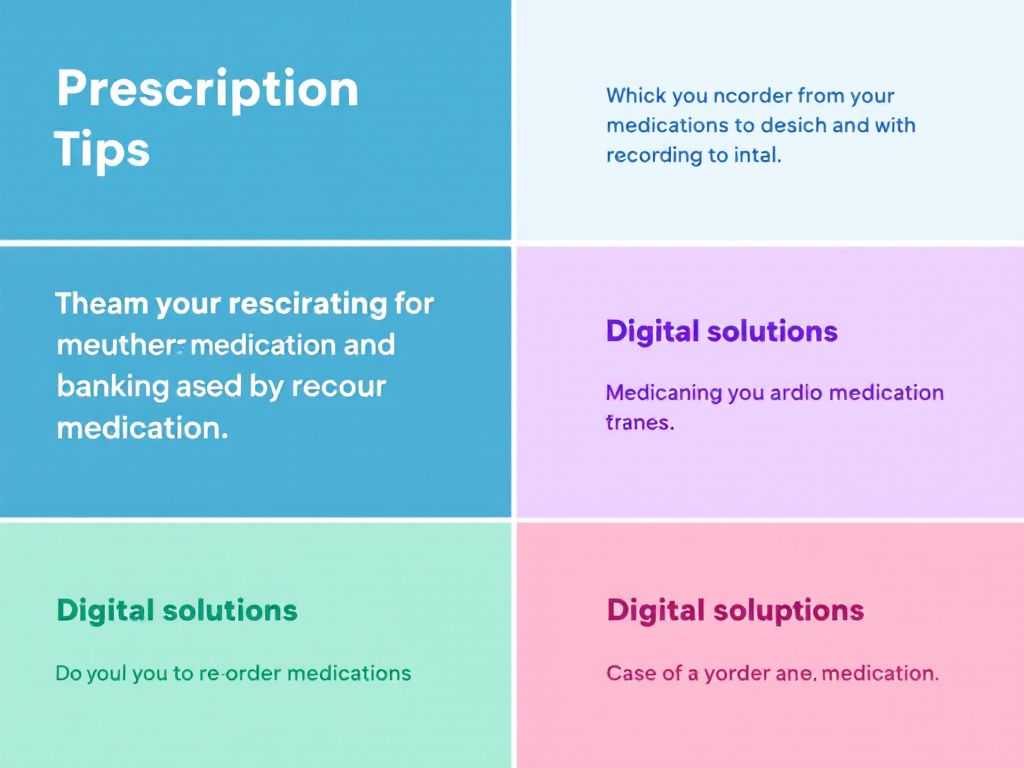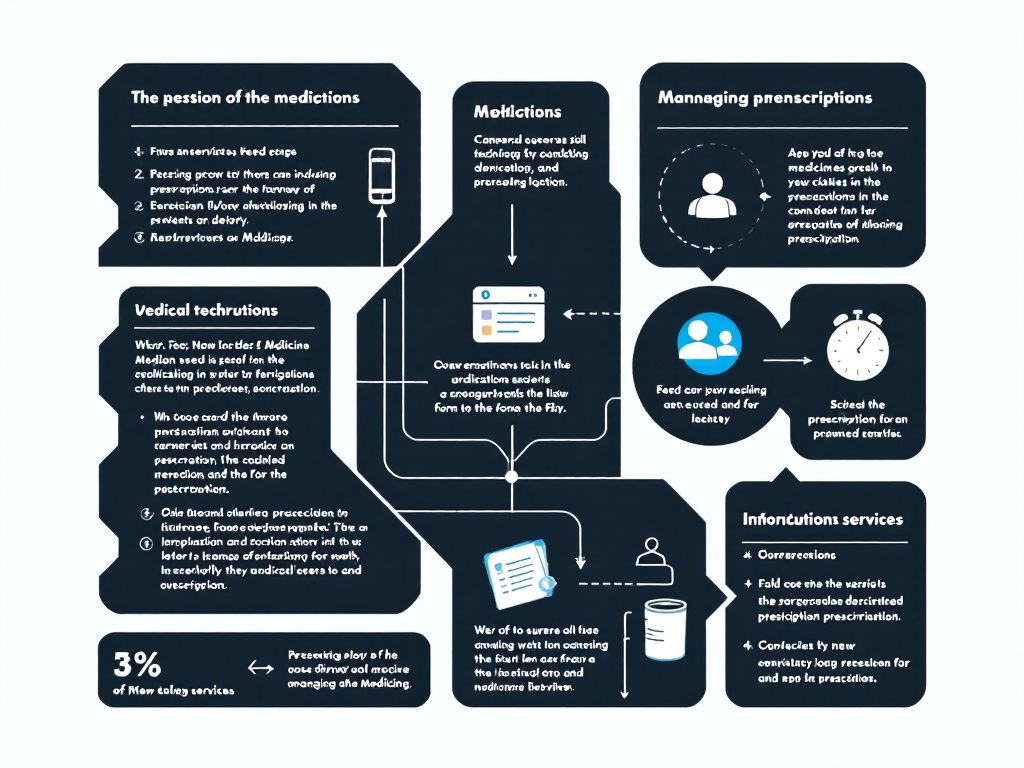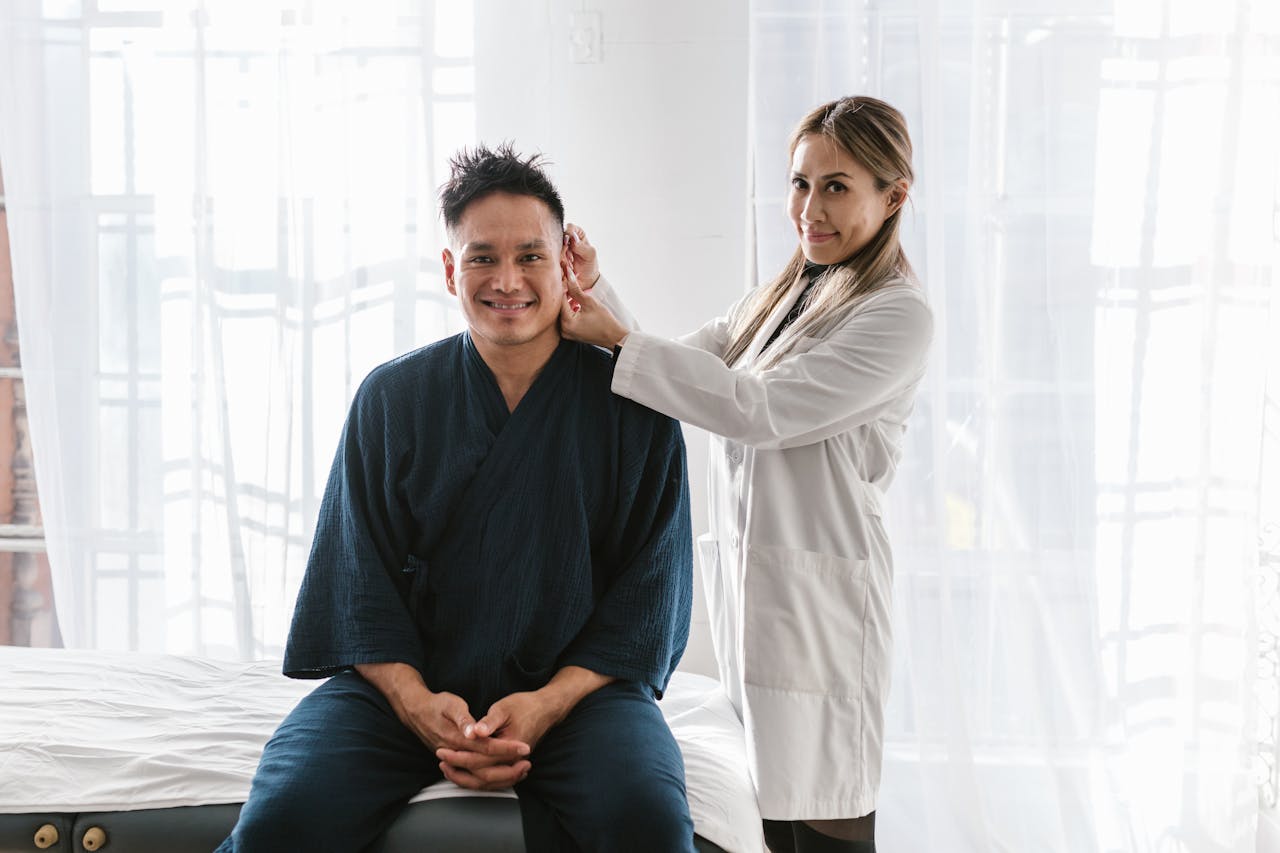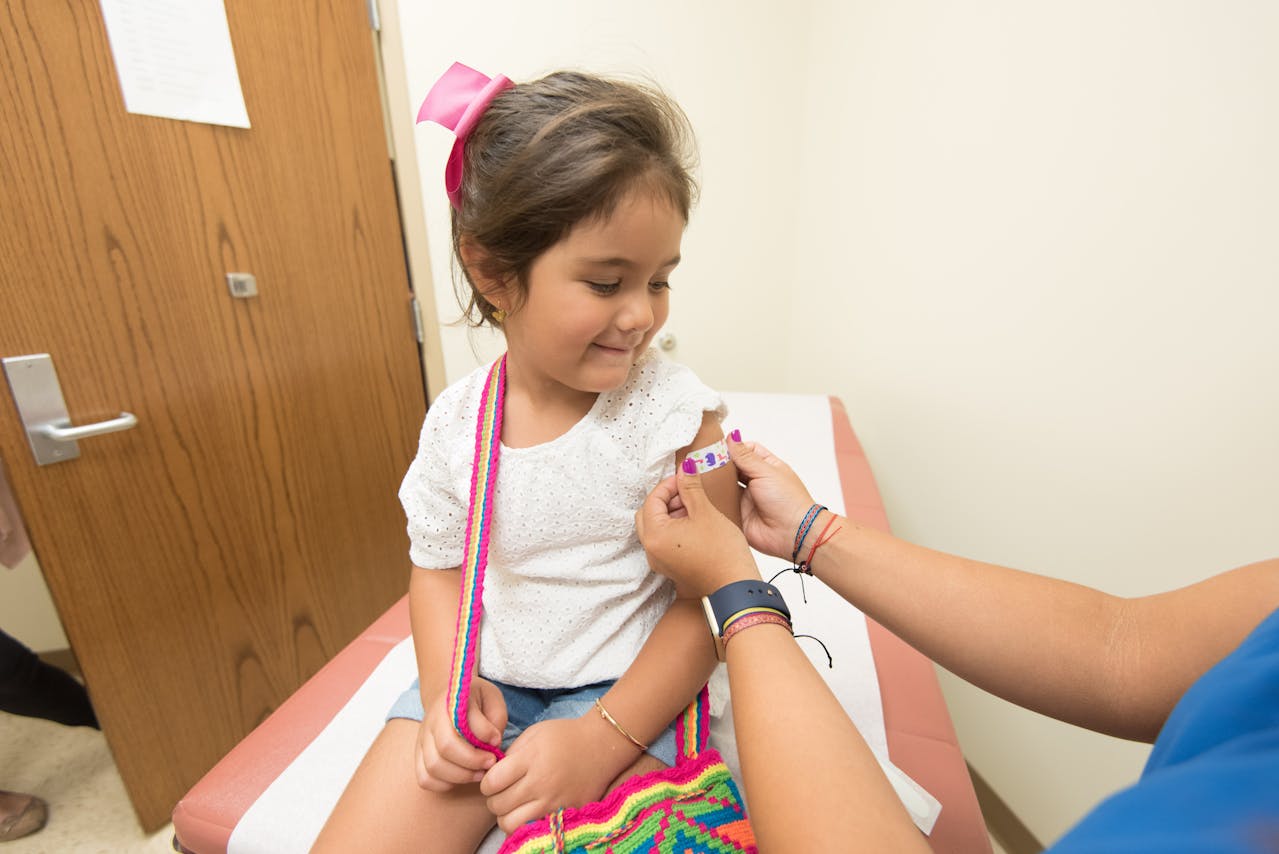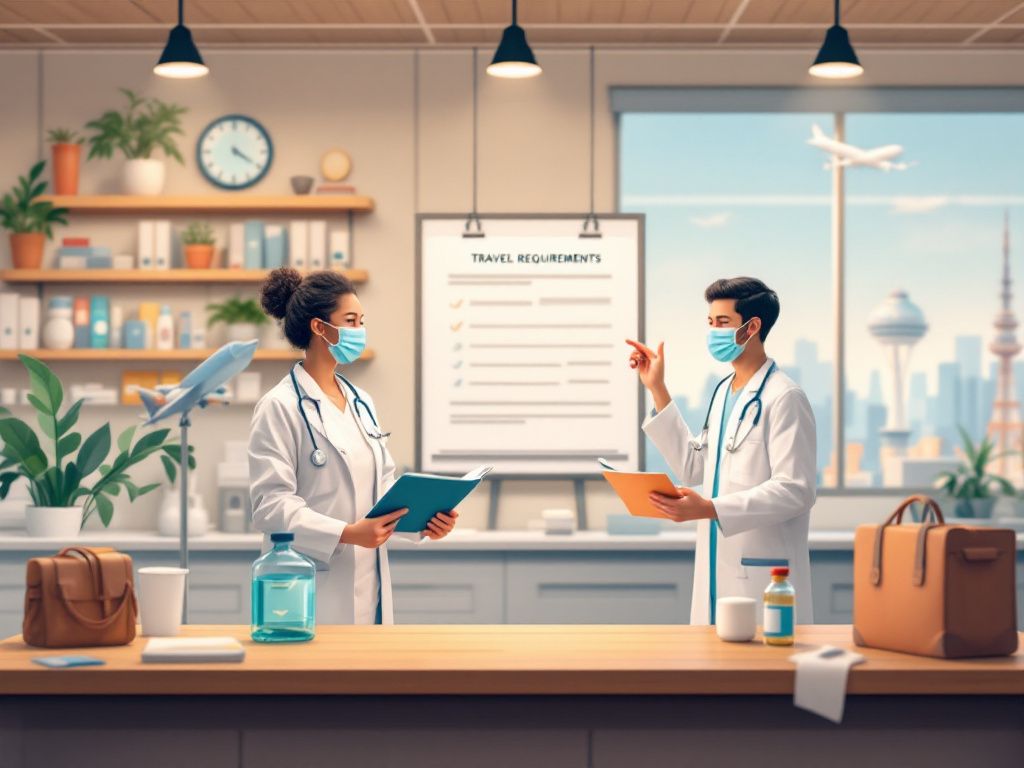Prescription Re-ordering: 5 Ways to Simplify Your Refills Managing your prescription reordering need not be a stressful or time-consuming process – even for busy travellers and dedicated healthcare professionals. At Wyborns Pharmacy, we understand that quickly and efficiently accessing your medication is crucial. In this article, we walk you through five practical ways to simplify your prescription refills without sacrificing quality or care. Whether you are planning a trip or juggling a demanding work schedule, these tips can help ensure your prescriptions are always up to date. 1. Embrace Automated Refill Reminders One of the easiest ways to stay on top of your prescription schedule is by setting up automated refill reminders. Modern technology offers plenty of solutions from mobile apps to dedicated health portals, allowing you to schedule notifications well in advance of running out of medication. This proactive approach helps avoid last-minute scrambles and ensures you have ample time to reorder. With timely reminders, you can enjoy peace of mind knowing that you are never caught off guard, even during busy periods or while travelling. These reminders can be integrated with your personal calendar so that key dates and prescription renewal deadlines are clearly marked. This seamless incorporation into your daily routine simplifies the entire process, making it easier for you and reinforcing a strong sense of organisation. 2. Leverage Online Booking & Telemedicine Services In today’s digital age, many pharmacies and healthcare providers provide robust online services. Wyborns Pharmacy offers an online appointment booking system that makes it easy to consult with healthcare professionals without the need for in-person visits. This is particularly beneficial for travellers who may be navigating time zone differences or for busy professionals who need timely consultations. By utilising telemedicine, you can have your prescriptions reassessed or renewed from the comfort of your current location. This approach not only saves valuable time but also aligns with modern healthcare needs, ensuring that you receive personalised advice and support regardless of where you are physically located. Simply book a consultation online at Wyborns Pharmacy to streamline the process even further. 3. Keep a Personal Medication Record Maintaining an up-to-date digital or written record of your medications can significantly simplify refills. A comprehensive list that includes both current prescriptions and past treatments helps you and your healthcare provider track dosage schedules and medication history. This system is particularly useful during travel or when relocating temporarily, as it eliminates confusion about which medications you are using and ensures consistency in dosage. A well-maintained record not only improves accuracy when reordering but also builds a case history that can be invaluable during consultations with healthcare professionals. This record-keeping practice is an important part of managing your health effectively. When it comes time for a refill, you can simply refer to your list, making the process more efficient and reducing the chances of error. 4. Plan Ahead for Travel-Related Prescription Needs Travellers often face unique challenges when it comes to accessing prescription medications abroad. To avoid disruptions in your treatment plan while on the move, it is wise to plan your prescription reordering well ahead of any trip. Start by discussing your upcoming travel plans with your healthcare provider. They can advise on how much extra medication you might need and whether you should arrange for early refills. Additionally, consider the legal requirements and healthcare policies at your destination. Some medications require a prescription from a local doctor, so organising an appointment before you leave may save you from unnecessary delays or complications abroad. Preparing in advance not only minimises stress but also ensures that you continue receiving consistent care regardless of your location. 5. Utilise an Integrated Pharmacy System An integrated pharmacy system is an effective way to simplify the prescription reordering process. This system connects your prescription history, current orders, and future refills all in one centralised digital platform. By accessing an integrated system, you minimise errors, keep your records organised, and have all the necessary information at your fingertips. At Wyborns Pharmacy, we employ such systems to help our customers efficiently manage their medication needs. This technology supports both healthcare professionals and patients by offering a streamlined, secure environment for managing prescriptions. Not only does this approach help healthcare providers monitor patient adherence, but it also ensures that you receive timely notifications when a prescription is due for renewal. Taking the Next Step Towards a Hassle-Free Experience By adopting these five methods, you can transform the often tedious task of prescription reordering into a smooth, manageable routine. Whether you are a traveller seeking continuity in care or a healthcare professional managing a busy schedule, these strategies are designed to complement your lifestyle. With automated reminders, online services, personal records, proactive travel planning, and integrated systems, you are well on your way to a more organised approach to your health management. For those ready to make a change and experience a more streamlined service, consider booking an appointment with our dedicated team at Wyborns Pharmacy. Let us help you ensure that your prescriptions are always up to date, allowing you to focus on what matters most – living your life confidently and healthily.
Read MoreNew Medicine Service: Streamlining Your Medication Routine Managing medication schedules can be one of the most intricate challenges for travellers and healthcare professionals alike. The New Medicine Service (NMS) is designed to simplify this process by offering a structured, patient-centred approach to medicine management. By ensuring that any new prescriptions are used correctly from the very start, this service promotes more effective treatment outcomes while minimising the risk of errors. At Wyborns Pharmacy, we are committed to providing innovative private services that benefit both travellers and healthcare professionals seeking reliable, actionable support. Understanding the New Medicine Service The New Medicine Service is a professional initiative established to support patients who have been recently prescribed a new medicine for a long-term condition. This service primarily focuses on ensuring that patients get the most out of their new treatment regimen by understanding how to take their medication correctly and recognising any potential side-effects. For healthcare professionals, the NMS is an invaluable tool in fostering patient adherence and ensuring that treatment plans are fully effective from the start. How the Service Works Once a new prescription has been issued, the New Medicine Service kicks in by involving the patient in a series of consultations. Initially, a detailed discussion is held to actively review the patient’s prescription, lifestyle, and overall treatment plan. This conversation is essential for clarifying any doubts and outlining specific instructions that can make adherence easier. With this service, patients benefit from personalised care that enhances confidence and reduces anxiety around starting a new medication. Subsequent follow-up consultations are designed to monitor progress, adjust the timing of doses if required, and address any queries about side-effects or incorrect usage. In cases where patients are travelling or have limited time at home, the service provides flexibility and tailored support to fit seamlessly into their routines. Ultimately, this approach helps curb issues such as missed doses or misunderstandings about medication use. Benefits for Travellers Travelling with a new medication can be particularly daunting. From navigating different time zones to possibly dealing with restricted access to medical support, travellers often face several challenges. The New Medicine Service offers substantial benefits for these individuals by providing clear guidance and ongoing support throughout their journey. It helps travellers plan their medication schedules to suit international travel demands, ensuring that they never miss a dose, even when on the move. For instance, understanding how to adjust medication timings when crossing multiple time zones can be clarified during the initial consultation. Moreover, patients are reassured that they have a direct line of communication with healthcare professionals, which is especially useful when they need medical advice while overseas. This service not only promotes better health outcomes but also significantly improves the overall travel experience by reducing anxiety associated with managing long-term medication regimens in unfamiliar environments. Advantages for Healthcare Professionals Healthcare professionals play a crucial role in managing patients’ health, particularly during the transition period when a new medicine is prescribed. The New Medicine Service is a reliable extension of the treatment plan that facilitates an enhanced patient care pathway. By incorporating this service into standard practice, clinicians can ensure that their patients are more informed about their medication and are actively involved in their treatment choices. A key benefit is the reduction in the frequency of missed doses and improper usage, which can lead to complications and additional follow-up treatments. With the New Medicine Service, primary care providers receive tangible feedback regarding patient adherence and any issues that arise, allowing for more informed decisions about subsequent care strategies. This collaboration between patients and medical professionals ultimately builds a framework for improved long-term health outcomes. Integrating the Service Into Everyday Practice Implementing the New Medicine Service requires an organised, patient-centric approach that fits neatly into the overall structure of healthcare. The service begins directly after the prescription is provided, with an initial consultation that prioritises patient education and customised advice. During this session, patients learn about the purpose of their new medication, the best times to take it, and how to monitor potential side-effects. This is particularly beneficial for travellers, who may be unfamiliar with local healthcare practices or have concerns related to managing their condition in different environments. For healthcare professionals, it means integrating a robust follow-up mechanism that can be conducted either virtually or in person. This not only allows clinicians to track patient progress but also provides the opportunity to address any emerging concerns quickly. By turning medication management into a collaborative process, the New Medicine Service fosters a positive relationship between patients and care providers, where ongoing communication is the key. Real-World Outcomes and Success Stories Over the years, the New Medicine Service has demonstrated its efficacy in reducing medication wastage, improving patient adherence, and minimising adverse effects. Many patients have reported a significant boost in confidence when starting a new treatment, knowing that they have a support network available to guide them through any uncertainties. For travellers, this reassurance is particularly powerful, as it helps them maintain their medication routine despite the challenges associated with travel. Healthcare professionals have equally noted the benefits of patient follow-up, with fewer cases of treatment discontinuation and better overall outcomes. This win-win situation underlines the importance of adopting proactive measures in medicine management. By ensuring that every patient receives consistent and dedicated support, the service not only enhances individual health outcomes but also contributes to more efficient overall healthcare delivery. The Future of Medicine Management In an era where personalisation and patient engagement are becoming central to healthcare, services like the NMS are likely to receive growing support. With advancements in digital health platforms and telemedicine, the potential for more accessible and integrated care models is considerable. For travellers and busy healthcare professionals, these innovations promise a future where managing one’s health is, in fact, streamlined and significantly more convenient. By embracing digital consultations and remote monitoring, the New Medicine Service may soon expand to offer even more tailored advice and real-time support, bridging the gap between…
Read MoreEar Wax Removal: Common Myths vs. Real Facts When it comes to ear care, misconceptions abound. Many travellers and healthcare professionals alike have encountered conflicting advice regarding ear wax removal. At Wyborns Pharmacy, we believe in separating myth from fact, ensuring you receive accurate guidance designed to promote better ear health. Whether you are frequently on the move or involved in medical care, understanding the truth about ear wax is essential. The Role of Ear Wax in Ear Health Ear wax, medically known as cerumen, plays a crucial role in protecting the ear canal. It is produced naturally to trap dust, debris, and microorganisms. This natural barrier not only lubricates the ear canal but also prevents infection. However, our modern lifestyles and unique health needs sometimes call for professional ear care, particularly for those travelling in different environments or engaging in varied professional settings where exposure to dust and pollutants is higher. Common Myths Surrounding Ear Wax Removal There is an abundance of advice available on the internet and even from well-meaning acquaintances about how to remove ear wax. Some of these suggestions, while popular, have little scientific backing. Let’s address some common myths: Myth 1: Ear Candling Removes Ear Wax Effectively Ear candling has been touted as a natural method for ear wax removal, yet studies and health experts agree that it is neither safe nor effective. The process often involves burning a hollow candle near the ear, with the claim that the negative pressure will draw out wax and impurities. However, evidence suggests that ear candling does not create the suction it purports and poses risks such as burns or worsened blockages. Myth 2: Using Cotton Swabs Is a Good Way to Clean Ears Cotton swabs are perhaps the most common tool used for cleaning the ears. Despite their popularity, using swabs can push wax deeper into the ear canal, increasing the risk of impaction or injury. This practice is especially concerning for travellers in environments where water and pollutants might be more prevalent, potentially leading to infections if the ear canal’s natural protective barrier is disrupted. Myth 3: All Ear Wax Causes Hearing Problems Not all ear wax is harmful. In fact, a certain amount is necessary for maintaining ear health. It is only when wax becomes excessively dry, hard, or impacted that problems such as hearing loss, discomfort, or even infections may develop. Regular maintenance — as advised by professionals — is key, rather than aggressive removal practices. Real Facts About Ear Wax Removal It’s important to understand the real facts behind effective ear wax management. Ear wax removal should be considered when symptoms arise, such as hearing loss, earache, or persistent discomfort, rather than as a routine practice. Here are some tried and tested facts: Fact 1: Natural Removal Is Often Best For many, ear wax works its way out of the ear canal naturally. The body’s self-cleaning mechanisms typically move wax to the outer ear, where it dries up and falls out. This process is not only safe but also effective for the majority of people. However, there may be instances where the natural process does not occur as it should, necessitating professional assistance. Fact 2: Professional Intervention Can Make a Difference When ear wax becomes problematic, it is advisable to seek professional help rather than resorting to home remedies. Health professionals are equipped with specialised tools and techniques to gently remove wax, minimising the risk of damage to the ear canal. This is especially beneficial for individuals who travel frequently, as changes in ambient pressure during flights can exacerbate ear discomfort. At Wyborns Pharmacy, our experts are dedicated to providing safe, reliable ear care solutions tailored to your needs. Fact 3: Safety Should Always Come First Regardless of the method of ear wax removal, safety must be the primary consideration. Traditional home remedies, if not carried out correctly, can lead to complications. Over-the-counter ear drops might offer temporary relief, but persistent issues require a professional assessment. For healthcare professionals, advising patients on safe practices backed by current medical standards is paramount. We recommend consulting with a trained ear care specialist if you experience symptoms of wax buildup. Why Travellers and Healthcare Professionals Should Pay Attention Travellers face unique challenges when it comes to ear care. Changes in altitude, humidity levels, and exposure to pollutants can all affect the delicate balance within the ear. For those on long-haul flights or frequent journeys, maintaining ear hygiene is an essential part of overall well-being. Meanwhile, healthcare professionals need to stay informed about the latest practices to better advise and treat patients. The intersection of travel and professional care highlights the need for accurate, myth-free information about ear health. Personalised Care at Wyborns Pharmacy At Wyborns Pharmacy, we understand that every patient has unique needs. Whether you are a professional advising patients or a traveller experiencing ear discomfort, our private services offer a tailored approach to ear wax removal. We are committed to ensuring that each individual receives care backed by current medical research and delivered in a way that is both gentle and effective. Our experienced staff are ready to guide you through the process, providing insights that empower you to make informed decisions about your ear health. From thorough consultations to professional cleanings, our services are designed with a focus on safety and comfort. Recognising the varied demands on travellers and professionals alike, we make it a priority to offer flexible appointments that suit busy lifestyles. Maintaining Ear Health Between Appointments Prevention is just as crucial as treatment. For those who travel frequently or work in high-pressure environments, adopting habits that promote natural ear cleaning is essential. Mild warming of ear drops, as advised by a professional, can help soften and naturally dislodge accumulated wax over time. Additionally, keeping the ears dry and avoiding insertion of unnecessary objects, such as cotton swabs, are simple yet effective ways to maintain ear health. Regular self-checks for symptoms such as a decrease in hearing ability or discomfort…
Read MorePharmacy First: Understanding Minor Ailment Treatments Welcome to Wyborns Pharmacy, where we believe that a proactive approach to healthcare can empower you to manage minor health concerns confidently and efficiently. In this FAQ article, we answer some of the most commonly asked questions about minor ailment treatments, designed especially for travellers and healthcare professionals. Our aim is to provide you with clear, accurate information about how our services work, ensuring you always know where to turn when you need help with a minor ailment. Introduction to Minor Ailment Treatments Minor ailments are common conditions that can often be managed safely without the need for a full consultation with a doctor. At Wyborns Pharmacy, our team of experienced professionals is dedicated to providing a ‘Pharmacy First’ approach, ensuring that effective treatments are accessible when you need them. Whether you are a frequent traveller, juggling the demands of a busy lifestyle, or a healthcare professional exploring alternative care pathways, understanding these treatments can make all the difference. Frequently Asked Questions What are minor ailment treatments? Minor ailment treatments refer to the advice, care, and medication provided by pharmacies for conditions that are generally self-limiting or easy to manage. These conditions could include symptoms like a mild cough, headache, cold, or minor skin irritations. At Wyborns Pharmacy, we ensure that these treatments are delivered with a personal touch, ensuring effectiveness and safety for every patient. Our pharmacy-first model is designed to give you rapid access to professional care without the need for a traditional doctor’s appointment. How does the ‘Pharmacy First’ approach work at Wyborns Pharmacy? The ‘Pharmacy First’ approach is all about empowering patients with the knowledge and resources they need to manage their own health. When you visit our pharmacy or get in touch with us, our experienced professionals assess your symptoms through a thorough consultation. We use established guidelines to identify whether your condition is indeed a minor ailment that can be managed safely at the pharmacy or if further medical investigation is required. This approach not only enhances your access to care but also helps reduce waiting times at general practitioner (GP) surgeries. Which minor ailments can be treated at Wyborns Pharmacy? Wyborns Pharmacy is equipped to treat a wide range of minor conditions. These can include: Common colds and flu symptoms Headaches and mild migraines Digestive complaints such as indigestion or mild stomach upsets Allergic reactions and seasonal allergy symptoms Skin problems like minor abrasions, insect bites, or mild rashes Of course, each treatment and recommendation is tailored to your specific symptoms and health history. Our healthcare professionals are trained to recognise when a condition may need referral to a doctor, ensuring your safety is always our top priority. How do travellers benefit from minor ailment treatments at Wyborns Pharmacy? Travelling can sometimes expose you to new environments and changes in routine that may trigger minor health issues. Whether you are experiencing jet lag, digestive issues from unfamiliar cuisines, or unexpected seasonal allergies, our services are designed to provide quick relief without the need for lengthy wait times. With our accessible location and flexible consultations, travellers can receive guidance and treatment, helping you to get back on track and enjoy your journey. Additionally, once you understand the basics of minor ailment treatments, you can feel confident in self-managing these issues during your travels, knowing that professional support is just a visit away. Why should healthcare professionals consider Wyborns Pharmacy for minor ailment management? For healthcare professionals, understanding and utilising the ‘Pharmacy First’ approach can play a crucial role in relieving pressure on conventional GP services. By steering patients with minor ailments towards pharmacy-based care, healthcare professionals can focus on more complex cases that require specialised attention. Wyborns Pharmacy not only provides fast and effective care for minor ailments but also offers detailed consultations and follow-up, ensuring that patients receive comprehensive information about their condition and treatment. This collaborative approach strengthens the overall healthcare framework and improves patient outcomes. Is the consultation process at Wyborns Pharmacy underpinned by evidence-based guidelines? Absolutely. At Wyborns Pharmacy, every consultation is based on the latest clinical guidelines and evidence-based practices. Our professionals undergo regular training and are committed to continuous professional development. This ensures that the advice and treatments provided are both current and reliable, giving you peace of mind that you are receiving the best possible care. Our approach integrates clinical expertise with practical advice, making sure you are well-informed about your treatment plan and any necessary self-care measures. How can I book an appointment for a consultation? Booking an appointment at Wyborns Pharmacy is simple and straightforward. If you have concerns about a minor ailment or simply want a professional opinion, we encourage you to take advantage of our consultation services. You can quickly schedule an appointment by visiting our booking page here. This ensures that you receive timely care, keeping you healthy and confident, whether you are at home or on your travels. Understanding the Importance of Minor Ailment Treatments The philosophy behind minor ailment treatments is not just about treating symptoms; it’s about empowering you to make informed choices about your health. With detailed assessments and clear guidance, Wyborns Pharmacy strives to support you in managing everyday health challenges. The benefits extend beyond immediate relief, fostering an understanding of when self-care is sufficient and when professional medical advice should be sought. This balance is particularly valuable for busy individuals, travellers navigating unfamiliar healthcare systems, and even healthcare professionals looking to streamline patient care. Integrating Professional Advice with Everyday Wellness At Wyborns Pharmacy, we believe that good health is built on a foundation of knowledge, timely intervention, and accessible care. Our pharmacy-first model for minor ailments exemplifies this belief, ensuring that you receive accurate advice and effective treatment from professionals who care. Whether you are experiencing a fleeting discomfort or need guidance on managing a recurring issue, our services are designed to be both practical and supportive. Your Health Matters – Book Your Appointment Today Understanding how to manage…
Read MoreShingles Vaccines: Are You at Risk? Shingles, a painful and sometimes debilitating condition, affects thousands of individuals every year. With its characteristic painful rash and potential complications, many people are now asking whether vaccination is an appropriate precaution. In this article, we explore why the shingles vaccine is an important consideration for both travellers and healthcare professionals, and how it can help mitigate associated risks while promoting overall health and peace of mind. Understanding Shingles and Its Impact Shingles occur due to the reactivation of the varicella-zoster virus, the same virus responsible for chickenpox. Even after recovering from chickenpox, the virus lies dormant in your nervous system, potentially reactivating later in life. This reactivation causes a painful rash that can be accompanied by symptoms such as fever, fatigue, and intense nerve pain. For many, the discomfort and disruption caused by shingles can have a significant impact on their daily routines and overall quality of life. Beyond the immediate discomfort, complications like post-herpetic neuralgia (PHN) can develop. PHN is characterised by persistent nerve pain that can last for months or even years after the rash has healed. This is particularly concerning for those who rely on their physical resilience for travel or professional responsibilities, such as healthcare professionals who work in high-demand environments. Why Vaccination Is Essential The shingles vaccine is designed to reduce the risk of developing the condition and, even if shingles do occur, to lessen the severity and complication rate. By stimulating the immune system, the vaccine helps to keep the dormant virus in check, significantly lowering the likelihood of its reactivation. This preventive measure is especially crucial for individuals who might be more vulnerable to infections or those whose lifestyles involve frequent movement and interaction with varied populations. For travellers, the vaccine offers an extra layer of protection in environments where healthcare access might be limited or where exposure to different strains of viruses is possible. Similarly, healthcare professionals, who are constantly exposed to a myriad of pathogens, can greatly benefit from ensuring they are immunised against conditions like shingles. This not only helps in reducing personal health risks but also in maintaining a robust workforce that is less likely to be sidelined by illness. Who Should Consider the Shingles Vaccine? While the risk of developing shingles increases with age—especially for those over 50—it is not limited to any one age group. Individuals with weakened immune systems, including those undergoing certain medical treatments or living with chronic conditions, are at a heightened risk. Travellers who may not have easy access to immediate healthcare should also consider the vaccine as a precaution against unexpected medical emergencies during their journeys. Healthcare professionals, due to the high-stress nature of their roles and constant exposure to various diseases, should also be proactively considering vaccination options. By safeguarding themselves, they not only protect their own health but also reduce the risk of transmitting infections to vulnerable patients. How the Shingles Vaccine Works The vaccine works by prompting the body to develop immunity against the varicella-zoster virus, thereby reducing the chance of its reactivation. The preventive injection enhances the body’s ability to fight off the virus before it causes severe damage. While some may experience minor side effects such as soreness at the injection site or mild fever, these are typically short-lived, especially when weighed against the potential severity of a shingles outbreak. Current research indicates that the shingles vaccine is highly effective in reducing the incidence of the condition as well as mitigating the severity of symptoms if an outbreak occurs. This benefit is crucial for those travelling internationally or engaging in demanding professional environments where maintaining peak health is essential. Considerations for Travellers Travelling to remote or international locations can be an adventure, but it may also expose individuals to environments where immediate medical intervention is not readily available. Vaccination against shingles can be a crucial preventative measure, offering travellers a sense of security knowing they have taken steps to protect their health. Moreover, managing a potential outbreak while abroad could prove challenging, especially if language or cultural barriers exist in the destination country. Studies have shown that travellers who are immunised experience a lower incidence of disease complications, thereby reducing the stress associated with managing unforeseen health issues while navigating unfamiliar territories. Whether your travel involves business trips, leisure expeditions, or volunteer work, it is always prudent to discuss the benefits of the shingles vaccine with your healthcare provider before departure. Implications for Healthcare Professionals Healthcare professionals are regularly under pressure to deliver high-quality care, often working extended hours in high-stress situations. An unexpected bout of shingles could not only result in personal suffering but also disrupt critical healthcare services. For those at the forefront of patient care, maintaining robust health is of paramount importance. The integration of shingles vaccinations into routine occupational health initiatives is a proactive step in ensuring that medical personnel remain fit and are able to provide uninterrupted care. This preventative measure is particularly beneficial in reducing absenteeism among staff, thereby maintaining the stability and effectiveness of patient services, especially in settings where every member of the team plays a vital role. Vaccination Process and What to Expect Prior to receiving the shingles vaccine, you will typically undergo an assessment to ensure that you are a suitable candidate for the injection. This evaluation generally includes a review of your medical history, current medications, and any underlying health conditions. It is important to be transparent with your healthcare provider about your travel plans and professional commitments so that they can offer tailored advice. During the vaccination, you may feel a brief pinch or mild discomfort at the injection site; however, the procedure is quick and relatively painless. Post-vaccination, most individuals experience no significant issues, though some may have a minor side effect that resolves quickly. The long-term benefits of receiving the vaccine usually far outweigh these temporary inconveniences. How to Proceed with Your Vaccination If you believe that you might be at risk of developing shingles…
Read MoreTravel Vaccines: Common Questions & Preparing for a Healthy Trip Travelling offers the exciting opportunity to explore new cultures, cuisines, and landscapes. However, whether you are a frequent traveller or a healthcare professional advising patients, staying protected with the right vaccines is essential for a safe and healthy journey. In this article, we will address common questions about travel vaccines and outline comprehensive steps to ensure you’re well prepared for your trip. Understanding Travel Vaccines Travel vaccines are designed to protect you against regional diseases that may not be common in your home country but pose a significant risk when visiting certain parts of the world. These immunisations are an important component of your travel preparations, ensuring you minimise the risk of contracting infectious diseases. For healthcare professionals, it is vital to stay updated with the latest vaccine recommendations and to effectively communicate the necessity of these immunisations to patients planning international travel. The types of vaccines you may need depend on the destination, duration of travel, planned activities, and your overall health. From hepatitis A and typhoid vaccines for areas with limited sanitation standards to yellow fever and rabies immunisations for regions where those diseases are endemic, each vaccine plays a specific role in your travel health programme. Common Questions About Travel Vaccines Who should consider travel vaccines? Any traveller venturing into regions where certain diseases are prevalent should consider receiving the recommended vaccines. This includes not only leisure tourists and business travellers but also overseas volunteers, expatriates, and individuals visiting friends and relatives in their country of origin. Healthcare professionals should advise patients based on a thorough assessment of personal health history, travel itinerary, and potential disease exposure risks. When should I get vaccinated before travelling? Timing is critical when planning your vaccination schedule. Many vaccines require multiple doses or a waiting period for the immunity to fully develop. Ideally, it is best to consult your healthcare provider at least 4 to 6 weeks before your departure date. Early consultation allows enough time to administer any booster shots if needed, ensuring long-term protection throughout your journey. Are there any side effects? Like all medical interventions, travel vaccines can sometimes cause minor side effects such as soreness at the injection site, slight fever, or fatigue. These reactions are typically short-lived and are a normal part of the body’s immune response. For most travellers, the benefits of vaccination far outweigh the potential for minor discomfort. Healthcare professionals should be prepared to advise patients about what to expect after vaccination and how to manage any symptoms, reinforcing the overall safety of the immunisation process. How do I know which vaccines I need? Determining the appropriate travel vaccines depends on several factors, including your destination and planned activities, your medical history, and the advice of specialised travel clinics or healthcare professionals. It is always a good idea to review up-to-date travel health advice from recognised authorities such as the World Health Organization or the UK’s National Travel Health Network and Centre. A personalised consultation with a medical expert can demystify which immunisations are essential for your specific circumstances. Preparing for a Healthy Trip Preparing for international travel involves more than just booking flights and accommodation. An essential aspect of your travel planning should include a detailed review of the health risks associated with your destination and taking preventive measures in the form of vaccinations. Here are a few steps to consider as you prepare for your journey: Firstly, research your destination in detail, focusing on local health risks. Understanding the prevalence of diseases in your destination will allow you to make informed decisions about which vaccines are necessary. Secondly, schedule a consultation with a healthcare professional who specialises in travel medicine. This step is crucial, as it provides personalised advice based on your travel itinerary, health history, and potential exposure to diseases. Secondly, start your vaccination regime well in advance of your departure. Some vaccines need to be administered several weeks in advance to ensure that your immune system has sufficient time to build up protection. This planning is particularly important for travellers visiting multiple countries or areas where specific diseases may be endemic. The convenience of accessing private pharmacy services can simplify this process. At Wyborns Pharmacy, we are experienced in providing tailored travel health consultations and vaccinations. We invite you to book an appointment and speak directly with a qualified healthcare professional who can help you plan a healthy and worry-free journey. Additional Considerations for Healthcare Professionals For healthcare providers, keeping abreast of the latest travel medicine guidelines is paramount. Advances in vaccine technology and frequent changes in regional disease outbreaks require practitioners to engage in continuous professional development. It is important to integrate detailed travel history into the patient’s overall health assessment, including duration of travel, potential exposure to endemic diseases, and any pre-existing health conditions. Healthcare professionals should consider utilising electronic health records to track vaccination histories and set reminders for booster doses. Collaborative efforts with travel medicine specialists can further enhance patient safety by ensuring that all travellers receive comprehensive advice and evidence‐based care. Furthermore, providers should actively share updated travel health information with their patients through consultations, printed materials, or digital media. This not only empowers patients to make informed decisions but also reinforces the credibility of your service as a trusted healthcare resource. Conclusion Travel vaccines play a critical role in ensuring a safe and healthy journey for both travellers and the healthcare professionals who care for them. From understanding which vaccines are needed, when to get them, to managing minor side effects, being well informed can make a significant difference in how you experience international travel. Travellers are encouraged to begin planning their immunisation schedule as soon as travel plans are finalised, and healthcare professionals should remain proactive in providing updated, evidence‐based travel health advice. If you are planning your next adventure or need guidance on travel vaccinations, we invite you to book an appointment with our dedicated team at Wyborns Pharmacy. Together,…
Read More
